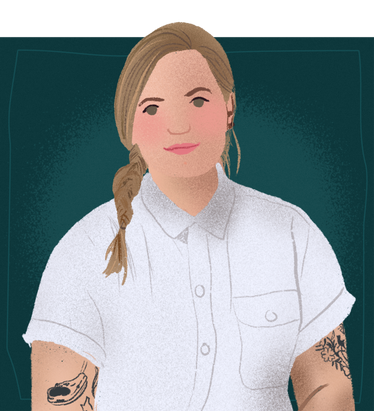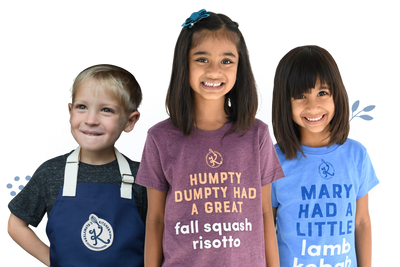
Taste Bud Profile
Brittanny Anderson

Chef Brittanny grew up in a fishing community in Virginia, forming a deep connection to the sourcing of the foods that she loved. She credits those early fishing experiences with her fearlessness around trying foods she has never had before. She credits her time raising livestock at Blue Hill at Stone Barns with deepening her relationship to how we source our food, and believes that if we all understood more of the processes behind getting food to our tables, we’d develop deeper respect for the people who grow and raise those animals and produce, and for the food itself.



Brittanny Anderson: I grew up in the Northern neck of Virginia, the peninsula and the Chesapeake Bay Area. It was a very heavy fisherman/watermen community. My family were all fishermen. My earliest food memories were all about fish—catching fish, cooking fish, eating big crab feasts with the entire community. I can remember being on the boat, and my dad would catch a fish and cut pieces of the filet off and we’d eat it right out of the water, sitting on the deck. I always used to jokingly brag that I was eating sushi when I was three. I know it wasn’t really eating sushi, but it was as close as I was going to get at the time! I also grew up hunting. For example, we ate wild turkey at Thanksgiving that we had hunted ourselves. I think the strongest thing that stands out to me about the community where I grew up is that we were all really connected with where our food came from. It was a great lesson to learn.

It wasn’t until the end of high school that I started to realize that not everybody had an openness and appreciation for food. Before prom, we went out to some restaurant and I ordered escargot. The table couldn’t get over it. They were saying “eww, disgusting”, and “what’s wrong with you?” And I was baffled—I was so surprised at their reactions. I kept saying, “this is nice! This is fancy!” But they couldn’t be convinced. And I realized that they had never seen it before and they were scared of it. It’s not like I grew up eating escargot all the time—but I do think that eating things, especially out of the water, exposed me early to the idea of not being afraid to try things. It struck me again when I went to culinary school, and I was really surprised at how many people, even people who loved food, had never gone fishing or hunting, or had ever even had their own gardens or grown any of their own food. I was surrounded by so much of that. Like any kid, you have your moments of wishing your life was different—there were plenty of mornings I wished I didn’t have to get on the boat that morning, or whatever. But eventually I realized that other people never had that experience or exposure, and that there were people who really wanted it. I felt lucky for that.
I have this deep connection to the water and seafood, but there are still plenty of things I haven’t tried. I remember one specific occasion while I was at culinary school in New York. I went to a Japanese restaurant, and they had live baby octopus. I remember this so vividly because I was nervous about it, but I think my exposure to eating so much fresh fish made me open and even excited to try it. It was so delicious, and it was just another exposure to a different flavor and a different way of eating something. I love Japanese food for that reason—there are similar or even the same food products that I was used to dealing with, but prepared and handled completely differently. It’s so exciting for me, and I love to eat it.
There’s nothing that I won’t try at least once.

I went to college to be a writer, but I also worked in restaurants from the age of 14. I was a dishwasher, a busser, a bartender—I’ve done every job in a restaurant, honestly. It was such a natural place for me to be. I grew up in a family that loves to eat, a family that loves to be in restaurants and hang out at bars. I was surrounded by that culture. I started watching the back-of-house more closely after some time and I would think, “man, we do this better at my house.” So eventually, I asked my chef if I could work a station one day a week, just to learn. He said, “I’m not going to pay you and you’re probably going to suck.” I didn’t care, I just wanted to learn. Eventually he started paying me. I looked around and realized that I should go to school for this. There was only so much I was going to learn in one restaurant. I just wanted to cook more, and learn more. I thought about the connection I had to food, and how it stemmed from growing up around a sustainably focused farming culture that wasn’t just a talking point, it was a way of life. It was a necessity. I wanted to continue to learn about that connection in a meaningful way, so after culinary school, I did an apprenticeship program at Blue Hill at Stone Barns. I cooked in the kitchen as well, but I was really focused on the livestock program. We raised sheep, chickens, pigs, and other animals. The program was focused on how to raise them, slaughter them, handle waste, and how the meat eventually makes it to our kitchens. For me, this was a natural progression of what I had grown up with, a deeper understanding of the connection I had always had to food.
When I opened my own restaurant, people asked me “why aren’t you cooking ‘Southern’ food?” To them it was about cuisine, but it just showed how little of a connection they had to food itself because everything I served at the restaurant was connected to our surroundings. It was from the place it was being served. We as a society are so disconnected from our food. I know so many kids who won’t eat meat with a bone in it. It hurts my soul, because to me this is an indication that the kid has no connection to the animal that the meat came from. Yes, talking about morbidity can be scary. But to me, it’s really about respect. This goes for adults too. Ever since I worked with livestock, I came to realize that if we talked more about the issues around raising animals for meat, we’d change our eating habits for the better. I really believe that. I always felt connected to the cycle–but I didn’t even realize how much effort it takes to get one pork chop to your table till I did that program at Blue Hill. There’s a lot of care and a lot of love that goes into ethical and sustainable farming, and I think kids can learn a lot from the entire process.
Appreciating animals, produce, and farmers will help kids see the full cycle of food, instead of just thinking it comes from a grocery store.

I wish I had known Kalamata as a kid! As a kid who was a very adventurous eater and loved food, I felt weird. I felt like nobody else liked the things I liked. I felt like I was supposed to want snack packs and peanut butter sandwiches instead of things I actually wanted to eat. It would have been nice to have a friend who made that cool for the other kids! Even as an adult, I have so few friends outside of the restaurant industry because it’s really hard for me to be friends with people who don’t understand how obsessed I am with all foods. I have nephews who are notoriously picky eaters and that’s just because their parents are as well. They come from multiple generations of Midwestern palates, Mac and cheese, chicken nuggets, and that’s about it. It makes me sad that they haven’t really experienced the same joy that I did through food. I think Kalamata can change that for kids who haven’t had that exposure. She makes food adventurous and fun, and honestly those kids are adventurous and fun in every aspect of their lives, so why not food too? I wish we could all be that way about food—make it exciting, make it fun. Adults are scared of food too. They pass that on to their kids a lot of the time. It’s a bummer.

